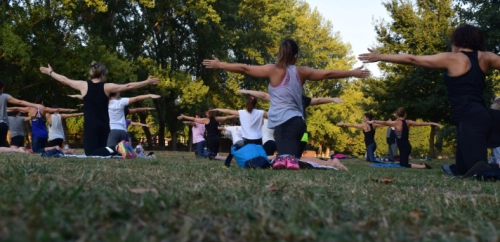What Does Yoga Teach You?

It seems like everywhere you look people are suggesting yoga as a way to help not only with your physical health but your mental, spiritual and emotional health. Before you add this into your daily routine, though, you may be asking yourself what exactly yoga teaches you that makes it such a great tool to have in your wellness journey toolbox.
The truth is, yoga teaches you a lot of great things that not only have to do with getting in touch with your body, but with your mind and your spirit. When it comes to the physical aspect, it teaches you how to understand the way your body moves and creates heightened levels of flexibility and awareness. Awareness, though, is the key term when it comes to the other areas it helps with as well. It can teach you patience and how to remove judgment from your life. Along with this, it can help build confidence and teach you how to love your body. These are just some of the great things that yoga teaches you.
That being said, to understand what exactly you learn from incorporating yoga into your life, you have to understand not only the core philosophies, but also what the chakras mean to the practice. So that's what we're going to take a look at in this article, along with some of the pillars and skills that yoga teaches you.
Core Philosophies of Yoga
The whole purpose of yoga is to unite the inner nature of the individual with the outer nature of the world itself. Not only will you have purification of the body, but an awakening of the spirit and consciousness that will help you align with the universal energies of nature that surround us every day.
Maybe the most important core philosophy of yoga is the ability to center yourself. This is the process of utilizing the energies within your body and aligning them in a way that allows them to flow freely, permitting a healthier body and mind connection.
This whole process takes practice and patience but once it is executed through the use of yoga as well as the meditation states within the practice, you'll be able to have an awakened higher self that allows you to bridge the boundaries that not only the world itself, but your internal world has set for you.
8 Limbs of Yoga
Within these core, philosophies are the yoga sutras. This is a collection of mantras that are often laid out in a form known as the eight limbs of yoga. Here are the 8 limbs and what they align with:
- Yama - moral code
- Niyama - self-purification
- Asana - postures
- Pranayama - breath control through rhythm
- Dharana - concentration
- Dhayana - deep meditation
- Samadhi - union with meditation
Breakdown of 6 main practices:
There are many different practices within yoga that you can choose from. But each of them has a core focus when it comes to the practice itself. So we thought as a way to help you understand what yoga teaches you, we would take a quick look at some of the more well-known yoga practices:
- Hatha - Hatha focuses on the physical and mental aspects of the body. It is intended to help get the body and mind primed to work together.
- Raja - This type of yoga is more about discipline in regards to the eight limbs of yoga and often centers around meditational practices.
- Karma - Everyone knows what karma is, so it's no surprise that this type of yoga focuses on the removal of negativity and selfishness so that you can live a more peaceful and productive life.
- Bhakti - If you're looking for a yoga practice that focuses on emotions and acceptance, then this devotional practice is a great option for you.
- Jnana - There are a lot of aspects to yoga, including a more scholarly approach. With this form of yoga, you're going to be focusing on learning the wisdom behind the practice and developing your intellect through them.
- Tantra - Ceremony, ritual, and consummation of a relationship is important. Through this type of yoga you'll be focusing on the more sensual and relationship-centric aspects of yoga.
Chakra’s: The Keys to a Balanced Life
As a real quick extra source of information, we're going to take a look at chakras which are key in yoga. Yoga practices, all in some way or the other, focus on aligning the chakras and ensuring that the energy is moving through them in a fluid state.
Here are the seven major chakras:
- Sahasrara - This is otherwise known as the crown chakra and is located at the crown of your head. This chakra is directly correlated with the spiritual connection one has with the universe.
- Ajna - This chakra is located between the eyebrows and often is called the third eye. It is all about the individual's intuition.
- Vishuddha - The throat chakra is tied to verbal communication as well as the immune system.
- Anahata - In the center of your chest it's the heart chakra and this is tied to relationships both professional and personal. It can also be associated with imbalances in the body with hormones and other organ control issues.
- Manipura - The stomach houses the solar plexus chakra, and this is tied to a couple of different things including self-discipline and self-confidence.
- Svadhishthana - Just below the belly button sits the sacral chakra. This chakra is in charge of vitality, well-being as well as your pleasure.
- Muladhara - The last major chakra sits at the base of your spine, and it is known as the root chakra. This is the one that helps ground your mind and body to the earth. It is also tied to your sciatic nerves and parasympathetic nervous system.
Pillars of Yoga: 10 Things That Yoga Teaches You
Now that you have a kind of idea of the core philosophies and the chakras that are so intertwined with yogic practices, we can take a look at a couple of things that yoga teaches you. Though there is a wealth of wisdom available in a yoga practice, here are ten of the things that we think are pillars of yoga:
Body Acceptance
When you're utilizing yoga poses within whatever practice you're doing, you're learning to embrace the way your body moves. Not only will you see physical changes when it comes to flexibility and even tone of your muscles (plus even maybe some weight loss), you will be learning that the way your body moves is beautiful, and really become accepting of the way it looks and moves.
Patience
Patience is a virtue! Through the breathing exercises in the meditative portions of a yoga practice, you're going to be learning how to be patient not only with yourself but with others. On top of this, perfecting the poses themselves requires patience and dedication, which will only serve to enhance this life skill.
Openness
One of the things that causes so much anxiety is the fear of the unknown. But by utilizing the practices within yoga and really aligning your energies, you will be able to be open to new experiences. This, in turn, will reduce your anxiety and allow you to live a fuller life.
Non-judgment
Judging ourselves and judging others takes up mental bandwidth that no one has to waste. Along with this, it also affects the way we have intercommunication with each other. But through yoga, you can remove that obstacle. By learning to accept yourself and others, you're going to be able to really have deeper connections.
Attentiveness
Yoga is a practice that has you in a meditative state but guided through someone else’s voice. To practice yoga properly, you have to be able to listen and listen attentively. This will translate to every aspect of your life and create better relationships for you.
Take Time
This world is fast-paced. There is a massive flood of information coming to you every day and people hustling around you to make ends meet. This can be quite stressful, but yoga will teach you to slow down so you can enjoy the moment.
Stay in the Moment
Most people's anxiety and stress come from the fact that they're replaying things that have already happened or trying to guess what's going to happen in the future. But in yoga, you have to be in the moment because not only are you trying to execute the poses properly, but you're trying to align your energies.
Confidence
Another source of stress and anxiety comes from a lack of self-confidence. But through the physical practice, as well as the mental practice, yoga will help you build your self-confidence, which will radiate out into your life, creating a more harmonious symbiotic relationship.
Compassion
Compassion can be a great tool to have. It allows you to understand everyone's point of view, which will help with conflict resolution. Yoga helps you learn to not only be compassionate with yourself, but with others also, and that is a wonderful lesson to have learned.
Trust
Trust is something that isn't easy for a lot of people. But yoga, when it comes to the mental aspect, will teach one how to really be in tune with their intuition through the realignment of their energies. On a physical aspect, you'll be more trusting of your capabilities as well. Both of these, though, will translate to relationships with others as well, which is always helpful.
Final Thoughts
Yoga has so much wisdom and skills that can be taught through consistent practice that it is beneficial for just about everyone. Understanding what the benefits are to your body, mind, and spirit can help someone see why it's such a great addition to their wellness journey. By incorporating a consistent and comprehensive yoga practice, many people will be able to find their way to living a much happier and healthier life.














